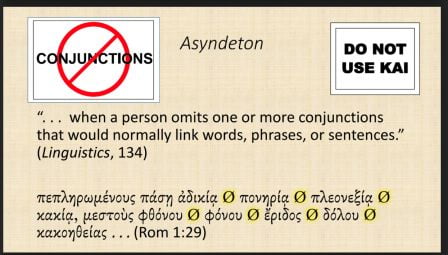For what it’s worth, here’s what I’ve learned. If the door is closed, don’t try to force it open. Let it go. No door closes without God’s loving approval. If the door is closing, let it close. Don’t keep trying to go into Asia. God has other plans.
David Alan Black, Dave Black Online.
Likewise, no door opens without God’s direction.
Tag: David Alan Black
-
Dave Black on God’s Calls
-

Who Does It?
(March 6, 2021) 6:10 AM Who’s work is it? It is yours or is it God’s? Already in our study of Philippians we’re having to ask this question. Paul has just thanked God for the Philippians’ participation in the gospel from the first day until now (1:5). That’s something they had done. But in the very next verse he attributes that work to God: “I am sure that God, who began this good work among you, will carry it on until it is finished.” In 2:12, Paul commands the church to work out their salvation with fear and trembling. But notice: they are to work out what God works in: “For God is the one at work among you both to give you the desire and the ability to do what pleases him.”
So, there’s our part and there’s God’s part. This is a constant theme in Paul’s writings. In Eph. 4:1 he turns from exposition to exhortation, from the indicative to the imperative, from what God has done in the past to what the Ephesians must do in the here-and-now, from doctrine to duty, from brilliant theology to mundane everyday living.
All this is simply to illustrate the great truth of the New Covenant: for the Christian, obedience is both required and enabled. “What the Law could not do, because it was weakened through the flesh, God did. He condemned sin in the flesh by sending his Son, who came in the likeness of flesh, to do away with sin. He did this so that the righteous requirements of the Law might be fulfilled in us, those who live not according to the flesh but according to the Spirit” (Rom. 8:3).
In the end, it’s always a matter of God working out what he has already put in. He helped Paul. He helped the Philippians. And he will help you as well, my friend.
-

Not Trivial Pursuit
(Feb 28, 2021) 5:58 AM Wow, the end of yet another month in 2021! Where has the year gone? It’s moving along at the speed of light. This year, as I continue to evolve as a person, a father and grandfather, a teacher, and a Christian, I’m sure my blog will evolve as well. But one thing I hope to emphasize as long as the Lord allows me to keep this venue open: The best way to learn the Bible is to give it away. When I teach and share things with others, that’s when I really learn those things. If you teach it, you retain it. It’s just that simple. Just share with others some truth God has impressed on your heart, and see how that feeds your own soul. So, for the remainder of the year, I hope to go over with you timely biblical truths again and again, like a cow chewing its cud, going over it and over it and over it. When the Lord teaches me something, I’ll pass it on to you, and together we will dig into God’s word and glean and gain all that the Bible has for us. This morning, for example, I was in Phil. 1:3-11 — the passage my students in Israel and I will be going over tomorrow. Allow me to paraphrase it for you:
I never say my prayers without thanking my God for you. All of my prayers for you are filled with praise and adoration to the Lord! Whenever I think of you, my heart is full of joy because of the wonderful way you helped me make known the Good News from the time you first heard it until now. Faithful partners — that’s what you are! And I am convinced that the God who began this good work among you will keep right on helping you do this until the work of world evangelization is finally finished on the day when Jesus Christ returns.
You know, don’t you, that I have every right to feel as I do about you. For you have always had a very special place in my heart. We have shared the grace and blessing of God both when I was in prison and when I was out as I defended and confirmed the truth of the gospel against all of its detractors. God knows how deep is my love and longing for you, as though Christ himself were expressing his tenderness for you through me. I truly love you!
As a result, my prayer for you all is that you will keep on overflowing with love for one another while at the same time growing in spiritual knowledge and insight. No sloppy sentimentality allowed! I want you to be able to see clearly the difference between what is “good” and what is “best” — the “best” being living for others in the cause of the Gospel — and at the same time to be so inwardly pure that no one can criticize you from now until Christ returns. You will be able to do this because God has already filled you with the truly good and upright qualities that come only through Jesus Christ. For this reason, may God alone (certainly not me or you) receive all the praise and glory!
Beloved, this is an apt description of what the church should be all about. The risen Lord himself had promised his disciples divine power to live holy and selfless lives and to witness to his salvation among the nations (Luke 24:48-49). And just think — in three decades these disciples had brought the gospel from the Holy City to the capital of the world.
Remember the game “Trivial Pursuit”? It’s a game we used to play as a family.
It’s still a game many of us play every day of our lives. It’s the pursuit of goals and dreams and ambitions and plans and priorities that aren’t eternal. Because of that, it’s a game nobody ever wins. Trivial pursuit is that blog post defending your “correct” view about politics, or that defense of “the best” way of learning Greek, or that apology for (or against) home schooling. Trivial pursuit is played every time we spend our time, energy, and thoughts in pursuit of trivial matters. Paul says, “Discern what is best — what is most important in life. Be done with lesser things. Exchange your ‘me first’ egotism for ‘you first’ altruism, like Jesus and Timothy and Epaphroditus did, and you will begin to live a life that’s truly worth living.”
What about it? Are you ready for that kind of a life? Let’s pursue it — together.
(From Dave Black Online. Used by permission.)
-
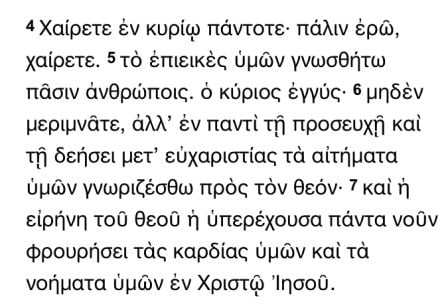
Asyndeton
Monday, February 22, 2021
7:20 AM Asyndeton. Gives me a Charlie Horse between the ears every time.
When an author fails to use a conjunction, how are we to understand his or her logic? Does the sentence in question go with what comes before it? After it? Or is it meant to be a stand-alone concept?
I was pondering this roadside hazard while reading Philippians last night. Here is Phil. 4:4-7. Paul’s injunctions stab the ears:
- Always be full of joy in the Lord!
- Again I will say it, Rejoice!
- Let everyone see how bighearted you are!
- The Lord is near!
- Don’t worry about anything!
- Instead, pray about everything! Tell God what you need and don’t forget to thank him for his answers!
- Then you will experience God’s peace, which is far more wonderful than the human mind can understand. His peace will set a guard over your thoughts and hearts as you trust in Christ Jesus.
Notice the words in green: The Lord is near! Why the reminder of the Lord’s presence? And why here? I think the answer might have something to do with the word I translated “bighearted.” The word can be used to describe a temperament that is even-keeled and well-tempered. A bighearted person doesn’t sweat the small stuff. He or she accepts the hand they’ve been dealt. They don’t insist on their own way. They are willing to meet others halfway. They are fair, self-controlled, gentle, and steady. When others freak out, they remain calm. Their whole demeanor says, “God is in control.”
How can you and I be like that? The Lord is near! When we are tempted to press the panic button, the Lord is right there facing the problem with us. And, since we are never far from his presence, why be anxious? We can take our concerns to him in prayer any time of the day or night. He is as near as the air we breath. Christ offers a haven for the storm-tossed vessel. Even in the midst of trouble, even there, yes, especially there, God is our refuge and our strength. I am going to try and remember that this week when I’m faced with anxieties and struggles, both within myself and with others.
Honestly evaluate your life. How do you respond to stress and hassles? Begin working with God to make his “Peace Plan” more evident in you.
From Dave Black Online. Used by permission.
-
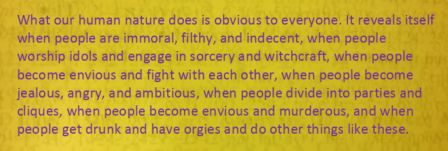
The Main Message of Galatians
Monday, February 15
6:22 AM The main takeaway I got from reading Galatians over the weekend? It’s much easier to be saved than to act saved. It takes very little effort to sound spiritual. But being spiritual? That’s another story. And just what does a saved person sound like? Well, there’s Tommy Theologian — you know, the guy who’s always talking about Calvinism and expository preaching and historic premillennialism and agape love. Being saved is all about what you know. John Stott used to call people like this “tadpoles” — all head and very little body. Then there’s Pat Popular, with his “Praise Gawd” outbursts and holy “Amens!” In Galatians 5-6, Paul offers us a better definition of “saved.” He is adamant that Christians show their faith by good (and not evil) living. His list of vices in 5:19-21 is hardly arbitrary. You can see this in my translation:
The opposite is also true: Paul’s nine-fold “fruit of the Spirit” goes from descriptions of the mind to human relationships to principles that guide one’s conduct. The word “love” controls it all. At some point, we need to unplug from today’s propaganda machine that bombards us with the three-letter word “Get!” It is the nature of God to give rather than get. And born-again Christians share that nature. But is the life Paul is describing really possible? He seemed to think so. That’s what grace is all about. We have received the opposite of what we deserved. Now it’s our turn to pass that grace on to others. We do this through love.
What is love? Read 1 Cor. 13. Or Rom. 12:9-21. Or Gal. 5:22-23. Then try writing a few practical applications of your own. For example, you might say, “Love is the kindness my son showed me when I needed my tractor fixed.” Or, “Love is the kindness I showed when I brought him and his family lunch the other day.” Love is ______. You fill in the blank. On a day-to-day basis, I’m more struck by the little deeds I see in others than their intellectual prowess or their spiritual boisterousness. When I look in the mirror each morning, I think, “Lord, you actually love this person.” Indeed he does. He’s got big dreams for me. For you as well. And he can spot a cover-up a mile away.
P.S. You may have noticed in my rendering of Gal. 5:19-21 the couplet “envious and murderous.” The word “murderous” isn’t found in some Greek manuscripts. I’ve argued for its originality here.
This, to me, is a clear-cut case of an accidental omission due to a mistake of the eye. Alas, the Alexandrian Priority position is so entrenched in New Testament studies today that scarcely any attention is paid to the longer reading. My friend Keith Elliott used to call this “The hypnotic effect of Aleph and B.” I’m glad to know I’m not the only one concerned about that. I guess that’s why I write books and compose essays and produce power points on the subject of textual criticism. The only way to know for sure whether or not “murderous” is original to examine the evidence for yourself.
(From Dave Black Online. Used by permission.)
-
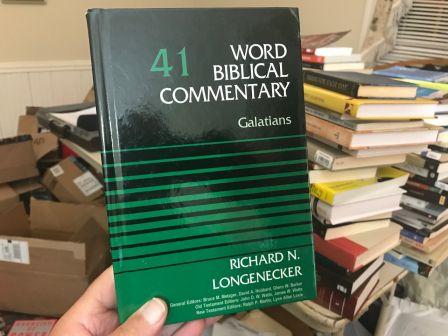
Commentary on Galatians
Sunday, February 14
6:50 AM I’ve always enjoyed reading the Word Biblical Commentaries. Sure, some volumes are better than others, but Richard Longenecker on Galatians is one of the best. Longenecker, who turns 91 in July, is probably best known for his commentary on Romans in the Eerdmans NIGTC series. But his Galatians commentary is its equal in every way.
In reading a commentary, I always start with the author’s preface. It usually tells you everything you need to know about the book you hold in your hands — the author’s approach, why he felt he was justified in writing it and adding to the already bloated publication scene, his presuppositions, etc. Since we are in Galatians this week in NT 2, I thought I’d reread Longenecker’s preface to his Galatians commentary. What shocked me was how he and I think alike in so many ways.
First, he says he is “always concerned with the history of interpretation — that is, with how a subject has been treated in the past ….”
Second, he wants “to know as much as possible about the circumstances behind the writing and the purposes for which its author wrote.”
Third, he approaches the letter “asking about its literary structures….”
Fourth, he is “concerned with the meaning of words in a text, both as to how particular expressions were used in the day and as to how a given author shaped those expressions for his own purposes.”
Fifth, he is concerned with “the identification and tracing of similar themes and parallel ways of looking at things in roughly cognate bodies of literature with the hope of spawning fresh interpretive insights.
Sixth, he is interested in “the development of thought in the apostolic period and beyond.”
Finally, he considers “the relevance of the NT for Christian faith and life today.”
All I can say is, “Ditto.”
First, I am addicted to what in Europe is called Dogmengeschichte — the history of doctrine. In fact, in Basel there’s an entire department devoted to this subdiscipline. Last week in my NT 1 class, during our discussion of the Synoptic Problem, I spent a considerable amount of time talking about the historical origins of the Markan Priority Hypothesis, my point being that no theory arises in a historical vacuum. Indeed, when one understands the origins of that hypothesis, I believe a case can be made that, from the very beginning, it was a false start, as I try to point out in my book Why Four Gospels?
Second, with Longenecker, I like to approach every New Testament writing as an occasional document — not just the epistles, but the Gospels as well. I assert that the Gospel According to Matthew is a manifesto asserting the right of the Jewish Christian church to exist alongside of and apart from Judaism. It likely originated in Palestine within 10 years of the resurrection and was necessitated by the calumnies being proffered by the Jewish opponents of Jesus. Luke, on the other hand, is a manifesto asserting the right of the Gentile Christian church to exist alongside of and as complete equals to the Jewish Christian church. Hence Matthew is the Gospel of Acts 1-12, while Luke is the Gospel of Acts 13-28. Of course, my historical reconstruction may be totally off. You’ll have to read the fathers for yourself to judge that.
Third, what isn’t there to love about the literary structure of the book you’re studying? Longenecker sees a twofold division in Galatians: a Rebuke Section and a Request Section. My own outline differs from that a bit. But without at least discussing the structure of a writing (its forest, if you will), there’s really no point in looking at the trees and the tiny saps.
Fourth, I find no little pleasure in doing lexical analysis in texts and asking how the author employs those lexemes to accomplish his goal in writing. A good example is the lexeme pherō in Heb. 6:1, a nautical metaphor that seems to have been missed by a good number of commentators (David Allen being a notable exception in the NAC series).
Fifth, parallels have always enchanted me. In fact, when we’re studying Galatians, it will be helpful to ask how Paul has pursued the same or similar themes elsewhere in his writings (Romans, for example). When I did my orals in Basel, one of my assigned topics was Paul’s letter to the Philippians. I prepared diligently. During the exam, however, nothing was asked about Philippians specifically. Instead, a question might have gone something like this: “In Phil. 1:19, Paul speaks of suffering as the rule, not the exception, of Christian living. Where else in his letters does he develop the same theme?” My Ph.D. students know that I’ll occasionally do the same thing with them.
Sixth, apostolic history forms the basis for several of my writings, including my book Seven Marks of a New Testament Church, where I take a close look at apostolic history to see what a New Testament church looks like.
Finally, if you take God seriously, you have to take the life lessons of the New Testament documents seriously as well. The New Testament wasn’t given for our information but for our transformation. Exasperating as it can be, applying the text is a must. The only hitch is that you must cock an ear to the Bible and, above the humdrum of life, listen for the gentle whisper calling your name.
(From Dave Black Online. Used by Permission.)
-

A Generous Disciple
8:40 AM My reading this morning was in what is probably my favorite letter in the New Testament. Perhaps no human being is less into writings that are too wordy, but the author of Hebrews doesn’t waste a single syllable. His point in the final chapters of his message (a letter, true, but more of a transcript of a sermon spoken to a group of Christians audibly) is that the way we love each other, serve each other, and live our lives with each other really matters. It’s a big deal to Jesus. One little snippet jumped out at me:
Don’t forget to do good and to share what you have with those in need, for such sacrifices are very pleasing to him (TLB).
This reminds me very much of Rom. 12:13 (which, by the way, is my life verse):
When God’s children are in need, you be the one to help them out (TLB).
Generosity ranks terribly high on Jesus’ list of required attributes for His followers. Back to Hebrews for a moment:
Stay away from the love of money; be satisfied with what you have. For God has said, “I will never, never fail you nor forsake you” (TLB).
The Greek here seems to be even stronger: “I will never, ever leave you, nor will I ever, ever forsake you” (5 negatives). But the promise is tied to the command: Be satisfied with what you have. Once again, I can’t help but think about Paul: “Godliness with contentment is great gain” (1 Tim. 6:6).
You know, friends, a person may have an abundance of things without an abundance of life. We can be poor in the midst of plenty. Has there ever been a generation who surrounded themselves with more things to make their lives enjoyable only to be the most bored and unhappy generation of all time? I remember watching the kids of rural Ethiopia playing with their toys. No, these gadgets didn’t come from Wal-Mart. The kids would find scraps of discarded plastic or metal and fashion toys for themselves. These kids had practically nothing yet were the happiest kids I think I’ve ever seen.
Here’s what I’m learning. Dave, life does not consist in the presence or absence of things. You are rich and have an abundance beyond the fluctuations of the stock market. “We have nothing and yet possess everything” wrote Paul (2 Cor. 6:10). I am both a pauper and a plutocrat! I have nothing because it all belongs to God and I am only its steward. I have everything because I am a joint-heir with Christ. I have all the advantages and none of the disadvantages of being both poor and rich.
Believe me, I’m still working on this generosity thingy. I am hardly immune to the feverish selfishness of this age. Yet the earliest Christians “had everything in common” and “gave to anyone as they had a need” (Acts 2:44-25). I’ve been reading a book by an author whose church gives more than half of its income to the needy. “We won’t spend more on ourselves than on our poor neighbor” were the author’s words. Think about that while looking at your church’s budget! Bottom line: Generosity has always been a characteristic of the society of Jesus. That’s because God is a generous God. And His Holy Spirit gives His people a tender conscience for the needy.
This is the kind of kingdom man I want to be and the kind of kingdom students I want to raise up. The extent of our generosity is but a whisper of our devotion to God.
-

One Tiny Sip of Living Water
Saturday, June 8
6:50 AM They had been predicting a steady rain to begin falling yesterday and, sure enough, that’s exactly what we have. The Low Pressure System we’re currently in will be around for about a week, which means much needed rain for the farmers where I live (including yours truly). This also means that I might not be able to get in my bike ride today, but if I don’t I still plan on visiting the Y and working out and getting in some laps. My tri is in exactly 15 days and I feel like swimming is my weakest link right now.
The rain this morning reminded me of that wonderful quote by the one, the only Malcolm Muggeridge, who once edited Punch Magazine, Britain’s counterpart to the Mad Magazine I grew up with. He said:
I may, I suppose, regard myself or pass for being a relatively successful man. People occasionally stare at me in the streets – that’s fame. I can fairly easily earn enough to qualify for admission to the higher slopes of the Internal Revenue – that’s success. Furnished with money and a little fame even the elderly, if they care to, may partake of trendy diversions – that’s pleasure. It might happen once in a while that something I said or wrote was sufficiently heeded for me to persuade myself that it represented a serious impact on our time – that’s fulfillment. Yet I say to you – and I beg you to believe me – multiply these tiny triumphs by a million, add them all together, and they are nothing – less than nothing, a positive impediment – measured against one draught of that living water Christ offers to the spiritually thirsty, irrespective of who are what they are.
As an incurable Muggerophile, I attempt to question traditional concepts at every turn, but not because I’ve become soured on life. Malcolm could be acid-tongued, but he was no kill-joy. He laughed a lot, and his love of the truth never turned him into a grumpy ascetic. But he cared deeply for the truth and trounced anyone who dared to corrupt it. That was the message I read this morning as I sipped my coffee.

Bible and Coffee! 1 John 2:20-28 is clear: We believers have had the Holy Spirit poured out on us by Christ, and so all of us know the truth. And as long as His Spirit remains in us, we don’t need anyone to teach us because His Spirit teaches us about everything, and what He teaches is true. Hence John’s final exhortation:
Obey the Spirit’s teaching, then, and remain in union with Christ.
Good reader, this was exactly the message I needed to hear today. I grew up immersed in typical Christian culture: go to church, listen to sermons, give to missions, and attend prayer meeting when you could. I was rarely challenged to read the Bible (or think) for myself. We can’t simply shrug this issue off, because biblical illiteracy is rife in our churches. Postmoderns share several key values, but one of them I respect the most is their insistence that church be relevant to all of life. They expect to be able to ask hard questions without being patronized or dismissed. Let’s give them the goods. And let’s begin by giving them God’s Word. They want to grapple with theology and ecclesiology and a thousand other topics. Remember this: The best antidote to evangelical group-think is reading the Bible for ourselves. Yes, I enjoy a good sermon as much as the next person. But Muggeridge got it right: Even the greatest sermon pales when compared to one tiny sip of the living water Jesus Himself promises to anyone who is thirsty, irrespective of who or what they are. The Bible is the best Christian resource out there, so let’s lift it high. Do I read books about the Bible? Sure do. Have I written books about the Bible? Yep. But nothing, and I mean nothing, can replace drinking directly from the fountain of knowledge itself.
P.S. My ever-productive assistant has again updated the What’s New? page at our Greek Portal. Included is a link to a journal article I published many years ago on the text of 1 John 2:20, where the apostle John either says to his readers “You all know” or “You know all things.” I argue for the latter reading, in case anyone is interested.
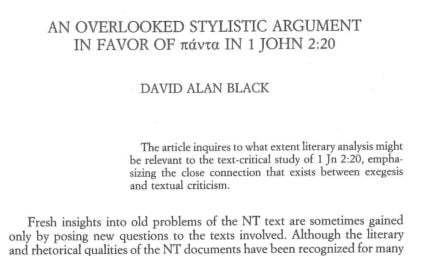
Overlooked Stylistic Arguments Regarding 1 John 2:20 -
We Can Be the People Who Tell the Truth
5:18 PM Hello blogging friends,
I trust you’re doing well. I’m sitting here nursing a head cold and trying to grasp the significance of what our nation just experienced. But first of all I want to join President Obama and Secretary Clinton in congratulating Mr. Trump on his election victory. I also promise to pray for him as he begins his term of office. As President Obama put it today, “We’re all rooting for his success.”
As you can probably figure out, I’m pretty much a conscientious objector when it comes to the Left/Right political wars. I guess I’m a self-described “misfit.” I call myself neither a Republican nor a Democrat. Unlike some of my fellow evangelicals, I came out neither for nor against Mr. Trump. This kind of politicization within evangelicalism is nothing new. On the Right we hear that we are to vote for the platform and not the person. But on the Right we also hear that we are to vote on issues of personal morality and not merely on pragmatic ones. Hence the dichotomy: some evangelical Republicans were enthusiastically supportive of Trump, while others were adamantly opposed to him. Growing up, I was taught that Republican is always right and Democrat is always evil. That, to me, is a distinction without a difference. I think Russ Moore nails it when he says that, after yesterday’s election, we evangelicals are “to maintain a prophetic clarity that is willing to call to repentance everything that is unjust and anti-Christ, whether that is the abortion culture, the divorce culture, or the racism/nativism culture.” In other words, be an equal-opportunity offender. He adds:
We can be the people who tell the truth, whether it helps or hurts our so-called “allies” or our so-called “enemies.”
He’s right. How can we defend a so-called “Christian” America that is hypocritical, homophobic, anti-immigrant, sexist, and bigoted? We can’t. Nor can we invoke a social gospel that ignores the personal gospel of faith in Christ. I believe that Left or Right, there’s an awful lot of corruption in politics. And the best way of addressing these issues, as my colleague Chuck Lawless put it today in his essay 10 Reflections on Today’s Election, is to acknowledge:
I am to be a good citizen of the United States while recognizing that the U.S. is not my final home. I am to stand for righteousness today even as I await the return of the Son.
I’ll add this. As far as I can see, I don’t think that past political dichotomies such as “Left” and “Right” matter that much to the students I teach. Younger evangelicals find themselves operating more and more outside of the traditional evangelical apparatus. For instance, younger evangelicals are more likely to have a gay friend than their parents and therefore tend to be more sympathetic to the gay rights movement even as they reject homosexuality as a sin. Ditto for issues of creation care and economic justice. They’re willing to probe theological and cultural issues that tend to be unwelcome in more established and traditional churches. They’re watching movies like Hate Rising. This means that at times they feel out of touch with the evangelical establishment. As I see it, this is a positive development. What we are seeing is the development of ordinary, rag-tag radicals who fear that both the Christian Right and the Christian Left have been allowed to pervert the gospel message and are determined to speak up about it. “Vote for so-and-so because he believes in Jesus as his personal Savior and supports ‘our’ values” no longer cuts it for them. They view such language as overly-politicized. And they’re not the only ones. Our evangelical “elders” have also struggled to make sense of the current scene in American politics – witness Wayne Grudem’s initial support of Trump as a “morally good choice,” then his taking a 180 degree turn from that position, and then finally expressing his support for Trump’s policies. This sense of uncertainty and ambivalence is dramatically reshaping the evangelical political agenda in the U.S. In such situations, the church may have an opportunity. To quote Moore again:
The most important lesson we should learn is that the church must stand against the way politics has become a religion, and religion has become politics. We can hear this idolatrous pull even in the apocalyptic language used by many in this election—as we have seen in every election in recent years—that this election is our “last chance.” And we can hear it in those who assume that the sort of global upending we see happening in the world—in Europe, in the Middle East, and now in the United States—mean a cataclysm before which we should panic.
Moore insists that such language “is not worthy of a church that is already triumphant in heaven….”
The church must be, as Martin Luther King Jr. taught us—the conscience of the state. But we do that from a place of gospel power, not a place of cowering fear. That means that we—all of us—should see this election as important for our country, but not ultimate for our cosmos.
I couldn’t have said it any better myself. The good news is that one day Jesus will win, not only all 50 states, but every tribe and nation. I for one am looking forward to that day. Meanwhile, having shattered the monopoly of the mainstream media and the political establishment in Washington, Donald Trump has revolutionized our entire view of evangelicalism. His “revolution” has shown that the old guard’s influence on the evangelical political agenda is still alive and well. This may well lead to new and profound changes in the way we American evangelicals conceptualize our role in society. I doubt, however, that younger evangelicals, the “ordinary radicals,” will be deterred in their efforts to develop a kinder, gentler form of evangelicalism. After all, they have begun traveling the downward path of Jesus. They’ve also begun reading their Bibles. And that is a very dangerous thing to do.
Staying centered in Jesus,
Dave
(From Dave Black Online. Used by Permission. David Alan Black is the author of a number of Energion titles, including The Jesus Paradigm, Christian Archy, and his most recent Running My Race. )
-
Cessationist or Continualist?
8:32 AM Are you a cessasionist or a continualist? I want to go on record and affirm that I am a passionate continualist.
- I believe we ought to continue the pattern of simple, radical, life-style evangelism begun in the book of Acts. After all, it worked for the early church.
- I believe we ought to continue bearing a humble, faithful, and consistent testimony to Christ, as the early believers did. Let moderns appeal to the sensational and spectacular; even the early church knew of signs and wonders. But the greatest work of the church has not been the spectacular but rather the faithful day-in and day-out living of normal everyday Christians.
- I believe we ought to continue the pattern of church discipline as practiced by the early church and call out “play Christians” that only go through the motions thinking they are Christians but unaware they are only pretending. When the secular press begins to mock our inflated membership statistics, isn’t it time we did something about it?
- I believe we ought to get out of our cozy churches and put Christ on display in the world’s darkness where we are needed. For the early Christians, the field was the world, and the corn of wheat had to die if it was to please God and bear fruit. Why, then, do we sit around debating theological puzzles when we ought to plant our lives in the ugly soil of the world?
- I believe we ought to continue the emphasis of the New Testament upon every-member ministry, since we are all priests – every one of us – of the Most High God. No church in the New Testament had a single pastor who did all the work. If you have such a leader in your church, fire him – and then hire him back immediately as your CEO, “Chief Equipping Officer” (Eph. 4:12).
- I believe we ought to continue the early church’s rejection of blind patriotism. The only Christian nation the Bible knows is the blood-bought, born-again purchased people of God.
- I believe we ought to follow the example of the apostle Paul and eschew the excellence of human oratory and any appeal to human wisdom. Nothing about the Gospel pleases this world – nothing! – and we are never so foolish as when we try to dress it up in the garish garments of this age.
- I believe we ought to continue the example of the early church and reject position and power as the measuring sticks of success. Why should we seek prominent seats in the kingdom when our Lord promised us not seats but suffering? Obedience cost John the Baptist his head and Jonathan Edwards his pulpit. What has it cost us?
So … are you a cessasionist or a continualist?
(From Dave Black Online. David Alan Black is the author of Energion titles Christian Archy, The Jesus Paradigm, Why Four Gospels? and Will You Join the Cause of Global Missions?. Used by permission.)



